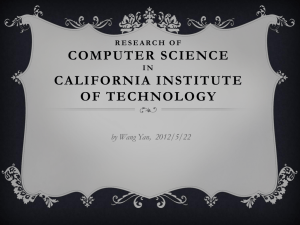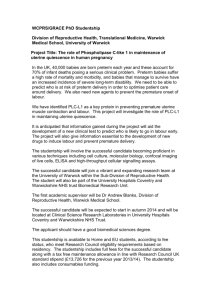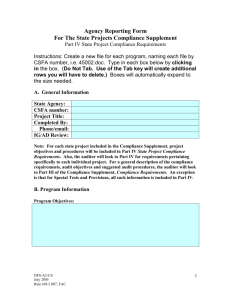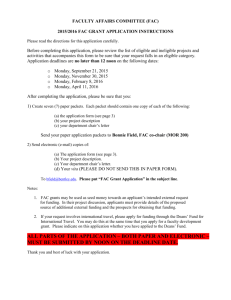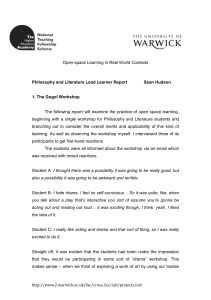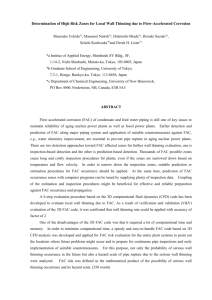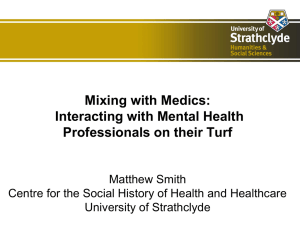Psychiatry Lead Learner, Final report
advertisement
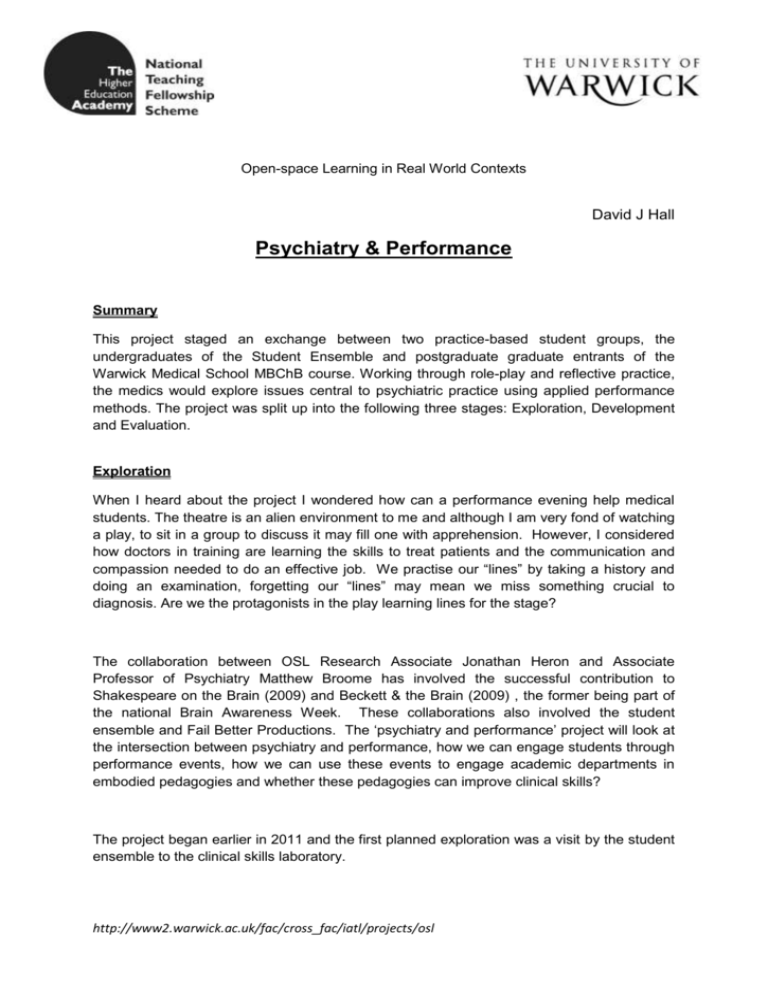
Open-space Learning in Real World Contexts David J Hall Psychiatry & Performance Summary This project staged an exchange between two practice-based student groups, the undergraduates of the Student Ensemble and postgraduate graduate entrants of the Warwick Medical School MBChB course. Working through role-play and reflective practice, the medics would explore issues central to psychiatric practice using applied performance methods. The project was split up into the following three stages: Exploration, Development and Evaluation. Exploration When I heard about the project I wondered how can a performance evening help medical students. The theatre is an alien environment to me and although I am very fond of watching a play, to sit in a group to discuss it may fill one with apprehension. However, I considered how doctors in training are learning the skills to treat patients and the communication and compassion needed to do an effective job. We practise our “lines” by taking a history and doing an examination, forgetting our “lines” may mean we miss something crucial to diagnosis. Are we the protagonists in the play learning lines for the stage? The collaboration between OSL Research Associate Jonathan Heron and Associate Professor of Psychiatry Matthew Broome has involved the successful contribution to Shakespeare on the Brain (2009) and Beckett & the Brain (2009) , the former being part of the national Brain Awareness Week. These collaborations also involved the student ensemble and Fail Better Productions. The ‘psychiatry and performance’ project will look at the intersection between psychiatry and performance, how we can engage students through performance events, how we can use these events to engage academic departments in embodied pedagogies and whether these pedagogies can improve clinical skills? The project began earlier in 2011 and the first planned exploration was a visit by the student ensemble to the clinical skills laboratory. http://www2.warwick.ac.uk/fac/cross_fac/iatl/projects/osl The Clinical Skills Laboratory On 14th March 2011, Jonathan Heron and five members of the student ensemble attended the Clinical Skills Laboratory at the Caludon Centre, Coventry and Warwickshire Partnership Trust, a core part of the medical school’s psychiatry curriculum, to observe the use of role play and simulation within medical training. During the laboratory, medical students rotate through six stations each with an experienced clinical teacher and a simulated patient with a different mental health condition. The idea is to practice taking psychiatric histories prior to clinical exposure. The student ensemble group noted that the realistic portrayal of the medical conditions was paramount and there are both scientific and empathic foci within the encounter. Student Ensemble A said, “What the interviewers have to do is....shape the conversation, draw out the information, and attempt to successfully structure both into a coherent form that can either sustain the conversation or draw the conversation to a conclusion; treatment.” While showing compassion to a difficult or stressful situation, medical students have to learn to extract information in order to form the larger picture or narrative of the patient’s story. Very often these encounters have a time frame and may sometimes feel like a “tick-box” exercise, especially in exam conditions. Student Ensemble B said, “Empathy and sympathy was just as important in gleaning information as getting all the appropriate questions in! Sometimes there seemed to be a very thin line between reality and performance!” Medical students have to learn “lines” in order to take a clear concise history, and as we are learning, we want to show compassion but at the same time we are planning and considering our questions. This may seem insincere but when it comes to taking a history in 10 minutes it may appear to be more like a performance than reality. Student Ensemble E stated that, “..the student stepped out of role...” Over 4 years we develop the clinical skills to become doctors, and we do re-enact scenarios, including practising being the patient, but then suddenly we are on the wards; our stage. At this point we have stepped out of our practised ‘role’ because we are faced with reality. How do other professions learn their job? By experience and being faced with the situations and learning from them. Any healthcare profession is constant education and development and the variety of personalities and interaction is immense and challenging on a daily basis. In the paper “Doctors as Performance Artists”, Dr Michael O’Donnell suggested that in the presence of patients, some doctors become performers. A doctors understanding of medicine can be acquired from the patients, much like a performer learns from their audience.1 He stated, “The empathy they have with their patients is one of the elusive qualities possessed by doctors whom patients feel better for seeing, whatever the treatment they prescribe.” http://www2.warwick.ac.uk/fac/cross_fac/iatl/projects/osl To conclude about the CSL visit another ensemble member had this to say: “All in all I found the entire experience absolutely fascinating and only came away wishing to know more about the sims and desiring to become one myself! I think that the use of sims are absolutely invaluable to these students as a way of learning. As students desiring to go into a career that is so interactive with other people daily it would be absurd for them not to gain good experience at talking to "patients" throughout their learning.” http://www2.warwick.ac.uk/fac/cross_fac/iatl/projects/osl Development The Evening The development stage of the project brought together clinical and creative practitioners on the evening of 6th June 2011 in a creative exchange involving rehearsed readings by professional actors and reflective discussion. In this phase we were specifically exploring how to engage medical learners through performance projects and enactive pedagogies. On the said evening, a diverse audience including doctors, medical students, simulated patients, sociologists, psychiatric nurses, and psychologists gathered together to listen to a selection of readings with a psychiatric theme. We had excerpts from “Diary of a madman” by Nikolai Gogol, “4.48 Psychosis” by Sarah Kane and “Discords” (adapted from Shakespeare). Following each reading the audience gave one statement per pair and after the three readings a reflective discussion was held. “Diary of a madman” portrayed the character, Axenty Ivanovich, from a seemingly well man, through his inner turmoil to finally being admitted to an institution in 1830s St Petersburg. His impressionable story gave insight into his history and as an observer you felt as though you were part of the journey. This allowed a deeper insight into his progressive illness, and formed a stronger foundation for understanding how to treat him. Following the reading we had the opportunity to give one statement per pair: “Captivating”, “self-justifying”, “showed lack of insight”, “The acknowledgement and justification of the strange happening” This last statement encapsulates how Ivanovich was feeling; he acknowledged his thoughts and justified them with his narrative. Yet the reading showed his “descent” into madness as a “slow unravelling” escalation. Through the reading you warmed to the character, he was likeable and we were drawn into his world. The group discussion raised some thought provoking points. When asked, does this give you insight, Dr Broome stated, “I think it’s a very good portrayal of psychotic illness...what’s striking is that everything the character sees he seizes on as evidence of his belief...175 years ago plus in a different country and it’s still a very realistic portrayal....The thing you see in the early stages is the dawning of awareness. It’s very impressive...it’s nice to know there is equal realism in works of fiction and drama.” So, performance can give medical students an accurate portrayal of psychotic illness, highlighting the need to delve further into the patient’s history to understand the early stages when a patient may begin to become more aware. It was stated that medical students appreciate a clear storyline that is sequential when talking of experiences of a condition. This is a reflection of our teaching, where the exploration of chronology enables us to spend time forming a stronger understanding of the patient. In this reading you see different stages of a psychosis developing, “It resembles a chronology of progression...an illness narrative”. A psychiatrist would see this progression but a medical student in an 8 week block may not have the privilege. Performance could fill this gap in student learning, to teach how to appreciate the full narrative of the patient and not be reliant simply upon the medical notes. By learning to appreciate an illness narrative in a play, for example, students could transfer this appreciation to real patients and be more aware in their history taking. http://www2.warwick.ac.uk/fac/cross_fac/iatl/projects/osl Another valid point was raised by one of the simulated patients, “The body language tells more of a truth than the mouth does”. Learning to read and respond to body language as much as listening to what is being said is a crucial skill for any medical student, particularly in psychiatry. It is here that verbal/written histories may infer little to the truth surrounding the patient as it will often be veiled. The powerful narrative of 4.48 Psychosis in 1990s UK, demonstrated some of the [shocking] truths of psychiatric management. “My mind is the subject of these bewildered fragments”, said Kane’s protagonist as it became evident that she was lonely and more than anything wanted a friend. It highlighted the need for compassion towards a patient, yet inferred the fine line of relationship between doctor and patient. The audience was torn between sympathy and aversion towards her. Their statements said, “Bitter”, “Disconnection”, “Too intelligent to love” Yet, “Honest, intelligent, unstoppable”, “Just want a friend”, “Ultra-sanity” The discussion opened up with praise for the accuracy demonstrated, “That is what we are presented with (clinically) on a daily basis. It would be an excellent learning opportunity for students to see.” However, when Kane’s protagonist described the long list of drugs she had been treated with the medical students demonstrated a slight “anti-psychiatry” leaning. The experienced practitioners gave a justified response, saying that the reading was, “Eerily authentic”, “fantastically accurate”, and that “psychiatry is still being developed...we’re still in the early stages of psychiatry...new treatments are coming out every day which improve the quality of life”. “Coping with not helping people is the big thing you will learn after graduation. The next step is coping with failure...sometimes all you can do is prevent decline.” “You can’t cure all mental health [problems].” The important thing to be highlighted here is that as medical students, we don’t learn about coping with failure. We learn about treatments but rarely learn about when treatments are unsuccessful. Why not introduce this skill of coping with failure through the use of scenarios with simulated patients in a safe environment? Another part of the discussion unfolded, “I thought it was very existential about how we are alone and death is there for all of us, but it is an illusion that we are almost not alone. We may be perceiving her as unwell, but actually a lot of what she says is true for everyone.” “There is a lot of hope...a lot of wellness in the piece.” ”Seeringly intelligent, insightful” http://www2.warwick.ac.uk/fac/cross_fac/iatl/projects/osl ”She is not able to live the illusion the rest of us need to get by.” I particularly liked this dialogue as it demonstrates the patient’s “ultra-sanity”, she is aware of her illness, she wants to get better and she has a degree of hope and faith that she will get better. We are taught about the biopsychosocial model of health in that every illness has a biological, psychological and social component to it and all three have to be addressed to get the fuller picture or narrative of that individual patient. We are not treating the disease, we are treating the patient as a whole and I think this narrative adds another prong to the model, that it is a biopsychosocial and spiritual model of health. A patient’s beliefs can have a positive or negative effect on their progression and these must be addressed when looking at the whole picture. Perhaps we should be considering the biopsychosociospiritual model of health. “Discords” is an adaptation from Shakespeare’s Macbeth and King Lear with some influencing from Samuel Beckett. The piece uses King Lear’s times he went “upon the heath” and Lady Macbeth sleepwalking. The student ensemble gave a wonderful performance which some found mind blowing to say the least - “Shakespeare Tourette’s” was one of the comments from the forum. It gave you the sensation of a “time bomb unable to explode”; is that how a patient feels? Some of the statements are as follows: “Disjointed insanity” “Rhythmical prison” “Most mad” “Lost in a loop” Some of the audience found Discords almost trancelike, it echoed of how one can imagine madness. The repetition of the lines within confinement started to become more powerful as they accelerated uncontrollably to an explosion that would not happen. The disjointed nature of this reading was perhaps a more real insight into madness and perhaps the reason why this piece was liked less since its definition was lost in a loop. Is this synonymous with psychosis? It is clear that performance can have a deep impact on how we may view a patient. Following the readings we had a forum discussion to interpret our thoughts towards the three pieces. This led to further deliberation of how performance may enhance clinical skills for medical professionals. Jonathan Heron stated, “Is there a way that we can, by collaborating, make events such as CSL and simulations safely unstable, pedagogically safe but experimental?” Through the use of the OSL we can make the simulations safely unstable by creating scenarios of difficult situations: what should I do if everything goes wrong? Regarding previous theatre productions for medical students, “Their gaze was, how is this relevant to my knowledge basis? We thought there was lots of learning about context and social things but [they] wanted to relate it to the body of knowledge rather than experience. Your focus is to get the technical knowledge to know you can practice safely.” http://www2.warwick.ac.uk/fac/cross_fac/iatl/projects/osl Dr Broome replied, “The challenge to us, is, how do you teach important things like: coping with failure, managing compassion versus professionalism, dealing non-verbally with interview techniques? How do you teach it in not a vague, woolly way?” It must begin with practical teaching involving collaboration as Jonathan Heron’s question suggests. Compassion and empathy are assumed to be innate and hopefully are, but these crucial qualities need to be developed during the training years in preparation for the experiences that will expand our abilities post-graduation. Teaching in a more open space area, with simulated scenarios to explore success and failure will define mechanisms that will help us cope. With fine tuning we can surely only become better at what we do. http://www2.warwick.ac.uk/fac/cross_fac/iatl/projects/osl The Questionnaire A questionnaire was issued to everyone who attended the evening and I received a 45% return. Because of the broad spectrum of professions of the attendees I wanted to generate ideas from all angles not just the medical students. While thinking of what questions to include, I wanted to get the general consensus on the evening and how we could take the project forward and implement some OSL into the medical curriculum. Questions 1-6 were aimed at everyone who attended while questions 7-13 were aimed at the medical students with the option for everyone else to contribute their thoughts. 1. What is your profession? Professions included medical student, doctor, actor, simulated patient, social researcher, engineer, pharmacist, and psychologist. 2. What did you think of the evening? Generally, feedback was very positive: “Excellent, very stimulating”, “interesting, inspirational”, “Compliments to all in organising event. All pieces performed were harrowing, moving, occasionally funny, caught up in individual fantasies and very well performed , directed, and organised. Can we have another, in the near future?” A number of people, especially the medical students described the event as “Thought provoking”, “thinking outside of normal parameters” “The evening gave us all a chance to see things from different angles” “...made me think outside my domain.” Therefore the project was able to make the audience think differently about mental health. 3. Are you involved in medical teaching? If so, in what capacity? About 50% of people were involved in medical teaching. 4. Do you think the use of performance can help improve clinical skills? If so, how? General consensus was yes, performance could help improve clinical skills by allowing the student to investigate challenging areas of medicine in a safe environment before meeting real patients. “ A good performance taps into the human and emotional aspects of the subject. This presents an opportunity to become familiar with different conditions and one’s responses to them in the safety of a non clinical setting.” http://www2.warwick.ac.uk/fac/cross_fac/iatl/projects/osl “Permitting exploration of behaviours and responses, giving time to reflect and reenact.” “It’s all too easy to follow formulary and protocol and sometimes that does not really take an entire personality into account. It allows you to see how a holistic approach would be more beneficial to a patient.” 5. How can we access the arts (theatre, film and literature) to improve teaching for healthcare professionals? “Consider using own theatre group of students. Use written materials in group teaching. Use film in short clips or more extended pieces to generate discussion.” “The obvious means is to use pieces that depict healthcare issues such as ‘Awakenings’, ‘A Kind of Alaska’. ‘The Cabinet of Dr Caligari’ should be compulsory viewing for all mental health practitioners! Expressionist and Surrealist art would have a role. Avoid ‘My Left Foot’ at all costs!” A number of people said that it should be incorporated into the curriculum to encourage participation. It was suggested to use relevant books, films and television in case studies to help improve our grasp on the patient experience when writing portfolios. “When groups of students are learning about a specific condition, then have evenings like tonight, to allow people to compose their subjective thoughts as a human being and not a healthcare professional. On reflection there will always be something to learn about how you interact with a patient.” From the suggestions, it was evident that all avenues of the arts could be used to illustrate healthcare issues. This is not just valid for psychiatry. The 2004 film “Inside I’m Dancing” gives an emotional rendition of a patient with Duchenne muscular dystrophy who is confined to a wheelchair but pursues physical and emotional independence in direct defiance of institutional living and societies prevailing attitudes. This was aimed at giving medical students a better understanding of disability and its effect was profound. We thought and discussed the way it made us feel and subliminally changed the way we viewed the prognosis of disability. It was exposure to something unfamiliar. It follows therefore that performance can have a powerful impact on our learning and appreciation. 6. Can the arts improve non-verbal communication? It was clearly agreed that yes it does. An interactive workshop could demonstrate the importance of non-verbal communication by putting doctor in patient’s shoes and vice versa. Being on both sides allows the medical student to consider their own ability to pick up on non-verbal cues and how they are able to make a patient feel at ease. “Non-verbal communication is the bedrock of good acting. Words account for under 10% of our craft, most is contained within body-language and tone of voice – the so called “inner life” of the character. Two actors can read the same text – one will make you laugh, the other make you cry – yet the words have been the same.” “Becoming more adept at listening and sitting back is essential to non-verbal communication, and when watching a performance this is exactly what one does. Art is a powerful tool for education and is often shunned as 'too fluffy'. Listen, observe, http://www2.warwick.ac.uk/fac/cross_fac/iatl/projects/osl become the patient. Step into the chair on the other side and understand how important a role you hold for patient care. There is much to learn from artists and their state of mind and how it inspires, affects and produces their work. It’s getting to the core rather than touching only the periphery.” 7. Would you be willing to use more role play in your learning? All medical students said yes. 8. Would a role reversal scenario help to increase empathy, i.e. you play the patient? A mixed response. “It would make us have to learn the condition thoroughly to be able to accurately portray the views and feelings of a patient. It would also teach us more about HCPs and how they can come across to a patient” “No, I don’t think most students have a lack of empathy that needs addressing.” 9. Would watching a performance with a psychiatry theme help improve your understanding of a psychiatric illness? All said yes. “It would approach it in a different and refreshing way, and variety in learning often aids in remembering conditions.” “Potentially very stimulating” As I have said previously, appreciating a patient’s illness narrative helps you see the bigger picture. O’Donnell stated, “Just as the knowledge doctors acquire from observing and testing their patients can enhance their knowledge of disease, so the understanding they may absorb from literature, or indeed any of the arts, can enhance their perception of the nature of an individual illness.” 1 10. How can the simulated patient workshops be improved? (Both psychiatry & GP) It was felt that the psychiatry simulated sessions would work better at the end of the block when the conditions have been learnt. However, having a session at the beginning and end of the block would enable students to see their improvement. In the evening discussion it was said that students did surprisingly better at the beginning of their block when using sim patients. This may be because the block has not yet been taught and thus the student is more questioning, less certain, not aware of the definitions that are about to be taught. This questions how knowledge gives certainty and possibly lowers our empathic threshold. 11. When during the 4 years at Warwick would these sessions be most worthwhile? http://www2.warwick.ac.uk/fac/cross_fac/iatl/projects/osl It was thought that the end of phase 1 and into phase 2 would be the best time for these sessions. Also having more practice near to final exams would be useful. 12. Can we be taught compassion and empathy alongside the science? Three of 5 medical students said no, the other 2 thought it would be hard to teach but possible given the correct tools and participation of the students. The non-medical students who replied said yes, it was an essential skill to learn. I think that the majority of medical students would agree that these are crucial skills in becoming a doctor but there is a belief that these skills are innate, that they are personal qualities we learn from experience. The belief is that they cannot be taught in a lecture or from a handout. 13. Why do medical students have such a stigma towards the "pink" modules? “They seem useless in phase one as it is not a relatable issue when sat in lectures” “It can be perceived as patronising. Often the skills they are trying to teach in lecture format can only be learnt in a clinical and practical setting and from experience. It is not something which can be given on a handout and expected to be learnt or understood.” “Pink modules are better learnt through interaction and discussion rather than lectures!” “Because you can’t be taught empathy! It just serves to make students less compassionate as they resent the implication that they need to be taught basic human emotion.” This question proved to be somewhat controversial, and I felt it important to ask since it had been inferred that evening that medical students find some modules such as sociology, health inequalities and illness behaviour to be “fluffy” and thus term them the “pink” modules. If performance art found its way into curriculum, would it also be termed “pink”? From the answers given, it seems that the interactive nature of performance would be deemed as beneficial and could enhance the standing of these subjects within the curriculum. The Medical Student Focus Group I met with a small group of medical students to discuss the evening and their suggestions. We talked about the simulated patients, the use of role play, the possibility of a new Special Study Module [SSM], the use of OSL, the current teaching of the psychiatry block and the use of sociology modules. The use of simulated patients was thought to be advantageous to the course in general and students were keen to have more sessions. It was suggested that the simulated patients could be further used to create difficult situation scenarios, for example in sexual history taking, ethics, angry patients, drug & sexual abuse. We currently have training in breaking bad news as part of the GP module so facing the other difficult situations as a junior doctor will be for the first time. Setting up a “difficult situation” workshop during senior rotation could let students be faced with these problems in a safe environment with advice from someone more senior. Regarding the teaching of ethics, it was agreed that it was essential but the lectures were dry and monotonous. Putting us in a simulated situation of ethical predicament http://www2.warwick.ac.uk/fac/cross_fac/iatl/projects/osl gives experience to remember, rather than a lecture and handout which is how the majority of the sociology based lectures are taught. These sessions are not very popular with students who find them patronising as postgraduates. The module IPLP (Interprofessional learning pathway) integrates other health care professional (HCP) students from Coventry University with medics to complete a three week e-based learning activity about a social issue e.g. alcoholism. This module is carried out 3 times in the 4 years and is compulsory to complete. It was felt e-based learning to integrate professionals was hypocritical and ineffective. The focus group suggested the use of the Open Space Learning to make these sessions more interactive, actually meet the other HCPs in person and carry out an activity or task based on problem based learning. This would also introduce us to interaction with other HCPs and prepare us for addressing situations together as a healthcare team. Depending on numbers, a workshop of this sort could be transferred to the hospital, e.g. in the clinical skills laboratories, where qualified HCPs could introduce more practical based activities. Digital learning has an important place in medical education, especially in anatomy, 3D imagery and digital libraries and a future learner-centred model would rely heavily on e-based activities. However, professional skills and integrated learning is more suited to the workplace or an OSL environment where a physical scenario or activity can be arranged. Currently, there are very few interprofessional events but these experiences could be invaluable in learning the skills of communication and effective team working. The introduction of a new Special Study Module [SSM] based on these events was a popular idea during the focus group. We carry out a 10 week SSM in the last semester of Phase 1. These are compulsory but you can sign up to any module, for example, there is a “Middlemarch” SSM where the group meet to discuss the medical based novel by George Eliot. This has proved to be popular and has led to the development of a book group. Other current SSMs are less creative and more technical. The focus group’s ideas for future SSM included: writing and performing a medical based play; an individual psychiatry SSM; performing an evening for the public inspired by the Performance evening we attended; making a video based on the arts and use it to promote the medical school; become a simulated patient - teaching drama skills to practise scenarios for clinical exams; medical humanities – exploring the humanities to provide insight into the human condition; Cinemeducation (1) refers to the use of film in medical education. A series of films could be watched and the potential learning curves discussed and then introduced into the curriculum; history of medicine – using film and literature as evidence. http://www2.warwick.ac.uk/fac/cross_fac/iatl/projects/osl The use of simulated patients in the current psychiatry block was popular. The compulsory attendance of students to an evening of psychiatry readings was suggested and the student writes a reflective piece afterwards. The use of film to teach the presentation of psychiatric illness would be a welcome change to textbook based learning. Students have the opportunity to sit back and observe the body language and see the narrative and whole picture of a patient. Again if it is made compulsory with submission of reflection, it is more likely to have involvement. Other ideas from the focus group identified gaps in the curriculum: Recognising our personal mental health (doctors have high incidence of depression, stress and addiction). How life coaching can be introduced to aid students o time management, o stress levels, o become a more rounded person. Other medical schools offer credits for non-academic achievements such as sport participation, drama, music and photography. These extracurricular activities are essential to any student for their work-life balance. It was felt that the SSM was a good opportunity for students to carry out a non-academic project which was still compulsory. http://www2.warwick.ac.uk/fac/cross_fac/iatl/projects/osl Evaluation If we as doctors can understand how to extend our own capabilities to experience what might go through the mind of someone with a mental illness, we can not only empathise better with our patients but also consider treatment options that may be more holistic. An artist’s experiences often dictate what they portray in their art, whether it be their own psychiatric issues or those of a loved one. They may have a strong insight into the emotion associated with the illness from onset to progression, which may be observed by the doctor as diagnosis to prognosis. Within a performance the stigma can be broken down by humanising the condition and putting the viewer inside the protagonists head. Gogol showed us that even after 175 years, the portrayal of psychotic illness is still very accurate. It was clear from discussion that an illness narrative is crucial in appreciating a better understanding of the patient. As a medical student we learn to act out scenarios which may come across as wooden in an exam. We act to pass an exam. Within this 5-10 minute time constraint, the mouth has to tell more of a truth than the body language, since we need to tick all the examiners boxes. For actors, non-verbal communication is the bedrock of their art. In our exam situation it has to be evident but the focus is more on our verbal communication. Learning to read and respond to body language as much as listening to what is being said is a crucial skill for any medical student, particularly in psychiatry. It is here that verbal/written histories may infer little to the truth surrounding the patient as it will often be veiled. Sarah Kane highlighted the fine line between compassion and professionalism; how else could this be portrayed to a medical student than through the arts? Kane also showed us that learning to cope with failure is a skill we may not learn until we are working as doctors. Why not introduce this skill through the use of scenarios with simulated patients in a safe environment? We can also learn to appreciate a biopsychosociospiritual model of health and acknowledge that a patient’s beliefs can have a positive or negative effect on their progression. Science is biased to build a consistent knowledge system; anything unvalidated such as spirituality is kept out of its realm. Healthcare professionals need to appreciate that medicine is not just science based, and although the current model of health is valuable in patient treatment, the introduction of the arts could develop a student to think outside of their domain. The abstract Discords was addictive and trancelike, echoing madness. It was clear from the evening that performance can have a deep impact on how we may view a patient, when seen from a completely new angle. From the questionnaire a number of valid points were raised and the audience found such an event thought provoking. This is what we want to achieve with medical students, to think/see/feel outside the box. Performance can help improve clinical skills by allowing the student to investigate challenging areas of medicine in a safe environment. It permits exploration of behaviours and responses and allows you to see how a more holistic http://www2.warwick.ac.uk/fac/cross_fac/iatl/projects/osl approach is beneficial to the patient. Using appropriate films and books can generate discussion and better illustrate the patients experience to the student. Interactive workshops and OSL can improve non-verbal communication. Role-reversal would allow students to reconsider their own approach towards patients and their own ability to pick up on non-verbal cues. Indirectly, this leads to an increase in empathy felt by the patient. The skills of compassion and empathy can be explored in an enhancing, developing nature and put to practice in difficult scenarios. The medical student focus group agreed that simulated patients should be utilised more. The IPLP module could be enhanced by more interaction perhaps in OSL form. Several ideas for a new Special Study Module were suggested and a need for more non-academic achievements to be recognised. An SSM would find its target group interested in the themes associated with performance arts, and would be the first step towards introduction to curriculum. We are learning a role, over 4 years we develop the skills to become doctors, we re-enact scenarios, we practise being the patient, and unbeknown to us, we are the protagonists in a play learning our lines for the hospital stage! http://www2.warwick.ac.uk/fac/cross_fac/iatl/projects/osl References 1) O'Donnell, M. (2005). Doctors as Performance Artists. J R Soc Med. 98 (7), 323-4. 2) Stuart M, Campbell T, Alexander M, Lenahan P, Pavlov A (2004).Cinemeducation: A Comprehensive Guide to Using Film in Medical Education. Abingdon: Radcliffe Publishing Ltd. http://www2.warwick.ac.uk/fac/cross_fac/iatl/projects/osl
